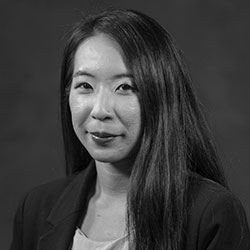The Achievement Index
Welcome to the School of Management's Achievement Index blog. Email your ideas and questions to us at pchandar@nyit.edu.
Insights from IABE-2024 New York Fall Conference
From September 27 to 29, 2024, School of Management proudly hosted the IABE-2024 New York Fall Conference. The International Academy of Business and Economics (IABE) is a prestigious global organization that connects academic scholars, business executives, students, and policymakers across diverse business-related fields. The purpose of the IABE conference is to provide a collaborative platform for both academics and practitioners to present their research findings, exchange insights, and explore solutions to current business challenges.
During the conference, Joshua E. Bienstock, L.L.M., J.D., director of the Center for Risk Management and associate professor, Eleanor (Ellie) Schwartz, senior specialist and M.B.A. student Su Myat Noe Wai (Su) presented and co-authored two papers. Su shared her insights with us on the Achievement Blog of the School of Management.
Can you describe your experience co-authoring the papers for the conference?
This was my second year attending the conference, following the publication of my first paper, “Navigating Economic Uncertainty: The Effects of Exchange Rate Volatility on Business Performance in Post-coup Myanmar (Burma) Coauthoring papers with professors has been an enriching experience. I worked closely with experienced academics who guided me through the research process, from developing the framework to conducting the literature review and data analysis for our paper on managing remote and hybrid workforces. The collaborative nature of the work was exciting, and through brainstorming and teamwork, we refined our approach, which strengthened the final paper. The most rewarding part was presenting our work and engaging with experts in the field. This experience has greatly enhanced my research, writing, and communication skills, and it has inspired me to further explore how AI can resolve workplace conflicts and improve hybrid workforce management.
What inspired you to choose or take part on the topics "Navigating the Challenges of Managing a Remote and Hybrid Workforce" and "Utilizing AI to Resolve Campus Conflicts"?
I’ve always been interested in workplace dynamics and improving management practices. During the pandemic, I saw how businesses struggled with the shift to remote work, which sparked my interest in hybrid workforce management. I wanted to explore how organizations can better navigate this global trend while maintaining productivity, engagement, and culture. I'm fascinated by AI's potential to resolve real-world conflicts, particularly on university campuses. AI can monitor communication channels to detect early signs of tension, allowing administrators to intervene before conflicts escalate. AI Chabot also provide 24/7 access to conflict resolution resources, while virtual mediation tools offer tailored solutions to disputes. Exploring AI for campus conflict resolution allowed me to merge my passion for technology with improving communication and problem-solving.
What key findings do you hope readers will take away from your research?
Personally, I believe that understanding the challenges of hybrid work creates valuable opportunities for organizations to rethink their structures and priorities. This research highlights the need for businesses to explore how technology can improve team dynamics and support better work-life balance in remote settings. However, it's important to acknowledge that some business owners prefer to have all employees return to the office and are promoting reward programs to encourage in-person attendance.
As for the paper on ‘Utilizing AI to Resolve Campus Conflicts,’ one of the core takeaways is that AI can play a transformative role in enhancing conflict resolution on university campuses. By predicting and addressing issues early, AI can significantly improve how educational institutions manage resource allocation and communication. From a student’s perspective, if AI tools are used for exams and assignments, it could have a major impact on how we apply our degrees in the real world after graduation. The challenge will be ensuring that AI is used as a supportive tool, rather than a substitute for developing essential skills.
How has this experience influenced your academic or career goals moving forward?
Co-authoring research papers and presenting at conferences has significantly influenced my academic and career goals. This experience reinforced my passion for solving organizational challenges and applying technology in innovative ways, particularly in hybrid work and AI-driven conflict resolution.
Academically, it has strengthened my commitment to pursuing a PhD after completing my MBA. This research has provided an excellent foundation for my future studies, where I plan to further explore workforce management and AI. Professionally, it has clarified my goal of working in roles that blend business management with technology. I am motivated to contribute to organizational transformation and continue growing as a researcher and leader.
What advice would you give to other students interested in co-authoring academic papers or participating in conferences such as this?
My first piece of advice is to start early and be proactive. Don’t wait until you’re far into your studies to begin engaging with research. Reach out to your professors and express your interest in co-authoring papers or getting involved in ongoing research projects. Being proactive shows initiative and opens doors to valuable experiences. It’s important to find the right mentor. Professors and researchers who are willing to guide you, provide constructive feedback, and collaborate closely are invaluable. They can help you understand the research process and navigate the challenges that come with writing and presenting academic work.
Student Feature
Su Myat Noe Wai (Su)
Master of Business Administration
Edited by Patthara Chandaragga

More Posts
All Posts



.png)